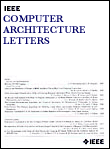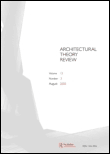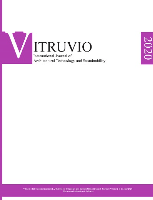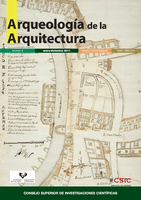
Cuadernos de Proyectos Arquitectonicos
Scope & Guideline
Connecting ideas and professionals in the architectural landscape.
Introduction
Aims and Scopes
- Architectural Theory and Criticism:
The journal delves into theoretical frameworks that underpin architectural practices, critically examining concepts from notable architects and movements. - Historical Contextualization:
It investigates the historical evolution of architectural styles and movements, offering insights into how past ideologies shape current practices. - Cultural Narratives in Architecture:
The journal explores the intersection of architecture and culture, focusing on how architectural design reflects and influences societal values and beliefs. - Materiality and Sensory Experience:
A significant emphasis is placed on the physical and sensory aspects of architecture, including the role of materials and spatial experiences in design. - Pedagogical Approaches:
The journal also addresses architectural education, discussing innovative teaching methodologies and the evolution of architectural pedagogy. - Transnational and Infrastructural Studies:
It covers themes related to connectivity, infrastructure, and their implications for urban development and architectural practices across borders.
Trending and Emerging
- Haptic and Sensory Design:
There is an increasing focus on haptic experiences in architecture, emphasizing how tactile interactions with spaces influence user experience and perception. - Architectural Historiography:
Recent publications have emphasized the historiography of architecture, examining how historical narratives are constructed and their implications for contemporary practice. - Urban Transitions and Peripheries:
The exploration of urban peripheries and transitional spaces has gained traction, reflecting a growing interest in how architecture responds to social and spatial inequalities. - Interdisciplinary Approaches:
A trend towards interdisciplinary studies is evident, integrating insights from sociology, psychology, and environmental studies into architectural discourse. - Radical Pedagogies and Architectural Education:
Emerging discussions around radical pedagogies indicate a shift in architectural education, focusing on innovative teaching methods that challenge traditional frameworks.
Declining or Waning
- Traditional Architectural Styles:
There appears to be a reduction in publications focusing on classical or traditional architectural styles, which may be overshadowed by contemporary and experimental approaches. - Local vs. Global Perspectives:
The emphasis on local architectural practices and narratives has diminished, with a shift towards more globalized perspectives that address transnational issues. - Purely Technical Discourses:
Technical discussions centered solely on construction methods or material properties have decreased, indicating a broader interest in interdisciplinary approaches that integrate social and cultural dimensions. - Historical Biographies of Lesser-Known Architects:
The focus on in-depth biographies of lesser-known architects has waned, as the journal shifts towards more thematic and conceptual explorations. - Nostalgic Architectural Critiques:
Critiques rooted in nostalgia for past architectural movements are less frequent, possibly reflecting a desire for forward-thinking and innovative design discussions.
Similar Journals

IEEE Computer Architecture Letters
Pioneering Research in Architectural Excellence.IEEE Computer Architecture Letters is a distinguished academic journal published by the IEEE Computer Society, focusing on the dynamic field of computer architecture. With its ISSN 1556-6056 and E-ISSN 1556-6064, this journal has been a vital platform for disseminating groundbreaking research since its inception in 2002. As of 2023, it holds an impressive impact factor, being ranked Q2 in Hardware and Architecture, placing it among the top tier of journals in this domain (Scopus Rank #74/177). The journal aims to promote innovative ideas and developments in computer architecture that drive advancements in technology and engineering. Although it does not currently offer open access, it remains a pivotal resource for researchers, industry professionals, and students keen on exploring emerging trends and methodologies. Each published article contributes to a deeper understanding of hardware design, performance optimization, and architectural innovations, establishing IEEE Computer Architecture Letters as a cornerstone of academic excellence in the field.

Bagh-e Nazar
Exploring the Intersection of Art and UrbanismBagh-e Nazar is a distinguished academic journal dedicated to the fields of art, architecture, and urbanism, published by the NAZAR RESEARCH CENTER in Tehran, Iran. With a focus on promoting scholarly research and innovative ideas, this journal serves as a platform for critical discussions and diverse perspectives on contemporary artistic and architectural practices. The journal is indexed under ISSN 1735-9635 and E-ISSN 2251-7197, reflecting its commitment to high academic standards and international visibility. Although currently not open access, it seeks to provide comprehensive insight into the socio-cultural dynamics influencing urban environments and artistic expressions. By bridging theory and practice, Bagh-e Nazar plays a pivotal role in advancing knowledge and fostering dialogue within the vibrant domains of art and architecture, making it an invaluable resource for researchers, professionals, and students alike.

Journal of Architecture and Planning -King Saud University
Bridging Local Practices with Global Perspectives.Journal of Architecture and Planning, published by King Saud University Press, serves as a critical platform for scholarly dialogue and innovation within the field of architecture and urban planning. This peer-reviewed journal, bearing the ISSN 1018-3604, aims to disseminate high-quality research that addresses contemporary challenges in architectural design, environmental sustainability, and urban development. Situated in Riyadh, Saudi Arabia, this journal not only highlights regional architectural practices but also fosters global discussions, making it an essential resource for researchers, professionals, and students alike. Although currently not open access, the journal is dedicated to providing extensive coverage of the latest findings and theoretical advancements in architecture and planning, paving the way for impactful contributions that can transform communities and enhance the built environment.

Architectural Theory Review
Challenging Perspectives in Architectural Discourse.Architectural Theory Review is a prestigious academic journal published by Routledge Journals, Taylor & Francis Ltd, located in the United Kingdom. With a focus on the interdisciplinary field of architecture and its theoretical underpinnings, this journal provides a critical platform for the exploration of contemporary architectural debates. Spanning from 2008 to 2016 and resuming from 2018 to 2024, Architectural Theory Review is categorized in the Q3 quartile of Visual Arts and Performing Arts, reflecting its significant contribution to the discourse within this area, as evidenced by its Scopus rank of #330 out of 667 journals. Although it does not offer an open access model, its rigorous peer-reviewed articles are valuable resources for researchers, professionals, and students committed to advancing their understanding of architectural theory. The journal's commitment to fostering insightful dialogue around architectural practices makes it an essential read for anyone in the field.

Prostor
Shaping the Future of Spatial Studies TogetherProstor is an esteemed scholarly journal published by the University of Zagreb, Faculty of Architecture, dedicated to advancing knowledge in the fields of architecture, urban planning, and spatial studies. Since transitioning to an Open Access model in 2006, Prostor has made significant strides in providing unrestricted access to its contents, fostering a vibrant community of researchers, practitioners, and students interested in contemporary issues surrounding the built environment and social space. The journal's commitment to quality is reflected in its impressive rank within Scopus, particularly in the Arts and Humanities category (64th percentile) and within Engineering (Architecture) at the 49th percentile. Covering a broad array of interdisciplinary topics, Prostor serves as a vital platform for disseminating innovative research and fostering dialogue among professionals while engaging with practical and theoretical explorations of spatial design. With coverage spanning over two decades, Prostor remains a crucial resource for anyone seeking to navigate the complexities of architecture and urban studies.

EGA-Revista de Expresion Grafica Arquitectonica
Empowering Scholars to Shape the Future of Architectural ArtistryEGA-Revista de Expresion Grafica Arquitectonica is a premier academic journal published by UNIV POLITECNICA VALENCIA, EDITORIAL UPV, specializing in the fields of architecture and visual arts. This Open Access journal has been a vital resource for scholars since its inception in 2003, facilitating the dissemination of innovative research and practice in these dynamic disciplines. With an exemplary Q2 ranking in Architecture and a stellar Q1 position in Visual Arts and Performing Arts for 2023, EGA exemplifies high standards of scholarly excellence, making it a critical platform for interdisciplinary dialogue. Its impact is further underscored by its Scopus rankings, placing it at the 67th percentile in Visual Arts and Performing Arts and the 41st percentile in Architecture, reflecting its growing influence within the academic community. Designed for researchers, professionals, and students alike, EGA aims to foster insightful exchange and knowledge advancement, thereby enhancing the future of architecture and artistic expression.

VITRUVIO-International Journal of Architectural Technology and Sustainability
Exploring innovative solutions in architectural technology.Welcome to the VITRUVIO-International Journal of Architectural Technology and Sustainability, a leading open-access journal published by UNIV POLITECNICA VALENCIA, EDITORIAL UPV since 2015 and based in Spain. With its ISSN 2444-9091, this journal is dedicated to advancing the field of architectural technology and sustainability, providing a vital platform for researchers, professionals, and students alike. The journal has made significant strides in the academic landscape, achieving a Q3 ranking in Architecture and a Q4 ranking in Building and Construction for 2023. It features a diverse range of scholarly articles that explore innovative practices, cutting-edge research, and sustainable solutions in architecture. With a Scopus ranking placing it at #70/189 in Architecture and #161/223 in Building and Construction, it is positioned within the 63rd percentile and 28th percentile respectively, demonstrating its increasing impact in these vital fields. We invite you to engage with our content and contribute to the ongoing discourse around sustainability in architectural practice.

Arqueologia de la Arquitectura
Illuminating the Past to Shape Tomorrow's ArchitectureArqueologia de la Arquitectura is a premier scholarly journal published by CONSEJO SUPERIOR INVESTIGACIONES CIENTIFICAS-CSIC, specializing in the intricate intersections of architecture, archaeology, and conservation. Since its inception in 2002, this Open Access journal has provided researchers, professionals, and students with a platform to share innovative findings that deepen our understanding of architectural heritage and its archaeological contexts. Based in Spain, it has demonstrated remarkable academic rigor and impact, achieving Q1 rankings in multiple categories, including Architecture and Visual Arts and Performing Arts, alongside a Q2 in Archaeology as of 2023. With a robust presence in Scopus, ranking within the 88th percentile for Visual Arts and Performing Arts, Arqueologia de la Arquitectura stands as a crucial resource for those dedicated to the preservation and study of our built heritage, encouraging interdisciplinary dialogue and research advancements in these elegant fields of study.

Ra-Revista de Arquitectura
Unlocking the potential of emerging voices in architecture.Ra-Revista de Arquitectura is an esteemed open-access journal published by UNIV NAVARRA, SERVICIO PUBLICACIONES in Spain, dedicated to the fields of architecture and the visual arts. With an ISSN of 1138-5596 and an E-ISSN of 2254-6332, this journal aims to foster a critical dialogue among scholars, practitioners, and students by offering original research, reviews, and case studies that challenge conventional architectural paradigms and inspire innovation. Since transitioning to an open-access model in 2012, Ra has expanded its reach, allowing free access to knowledge that resonates within both academic and professional communities. Although the journal is currently ranked in Q4 in its respective categories, it remains a vital platform for emerging voices and advancements in the architecture and visual arts disciplines. Researchers can find valuable insights that push the boundaries of both theory and practice. The journal is part of a vibrant academic tradition, contributing to a deeply reflective cultural heritage, and it invites contributors from diverse backgrounds to submit their works for consideration.

Festival dell Architettura Magazine
Connecting Ideas Across Urban Studies and the ArtsFestival dell Architettura Magazine, published by FESTIVAL ARCHITETTURA EDIZIONI, is a distinctive Open Access journal dedicated to the realms of architecture, urban studies, and the visual and performing arts. Established with a vision to foster interdisciplinary dialogue, the journal has been a part of the academic landscape since 2013 and has converged its insightful contributions from 2018 to 2023. Despite being ranked in the lower quartiles in its respective categories—Q4 in Architecture and Urban Studies, and Q3 in Visual Arts and Performing Arts—this publication remains vital for emerging researchers and seasoned professionals alike, as it provides a platform for innovative ideas and practices from Italy and beyond. It serves as a key resource for those who wish to engage with contemporary architectural thought and cultural expressions, facilitating open access to research that highlights the intersections of space, society, and art.